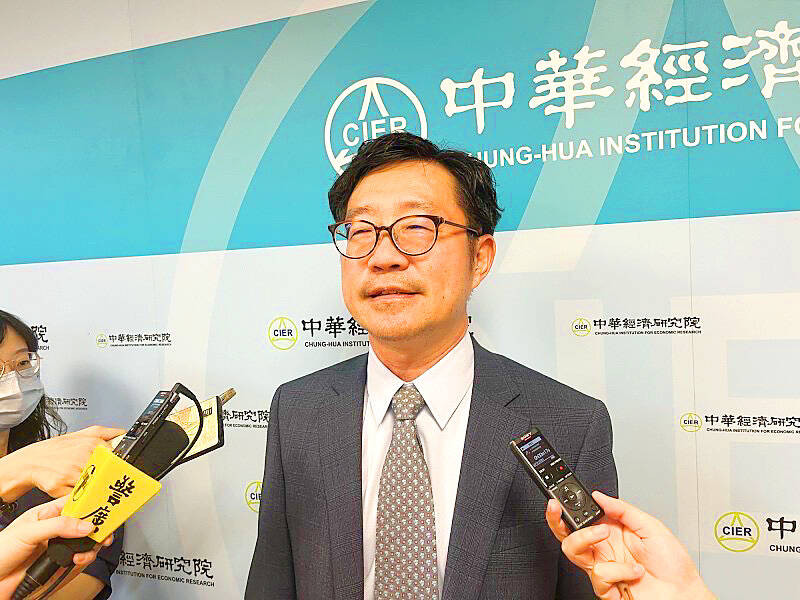The Chung-Hua Institution for Economic Research (CIER, 中華經濟研究院) yesterday trimmed its forecast for Taiwan’s GDP growth this year from 3.22 percent to a range of 2.85 percent to 0.16 percent, depending on how US tariffs settle and affect Taiwan and the world.
It is the first time the Taipei-based think tank laid out a growth range rather than a clear-cut figure, saying it is extremely difficult to arrive at a conclusion given US President Donald Trump’s unpredictable trade policy.
“The only certainty is that [Taiwan’s] GDP growth is set to slow while inflation pressure would go up,” CIER researcher Peng Su-ling (彭素玲) told a media briefing.

Photo: Hsu Tzu-ling, Taipei Times
Trump on April 2 announced a 32 percent tariff on imports from Taiwan, but one week later introduced a 90-day suspension for major trading partners except China.
Despite the respite, uncertainty surrounding global trade has rattled corporate confidence, especially in trade-reliant economies.
In a worst-case scenario, Taiwan’s GDP growth could falter to just 0.16 percent this year, if global trade tensions escalate into a full-blown recession or stagflation, CIER president Lien Hsien-ming (連賢明) said.
The biggest problem right now is uncertainty, leaving local manufacturers hesitant to make new investments or other major decisions because the future is so murky and fluid, the academic said, adding that the chance of the worst-case scenario is low at 10 to 20 percent.
The 90-day suspension has brought a wave of urgent orders to Taiwanese firms, but Lien said the momentum is unlikely to sustain for long.
It is too early to tell how Taiwan would emerge from the US-China trade war, though the country is receiving short-term benefits in the form of order transfers, Lien said.
Taiwan’s heavy reliance on both the US and China as key export destinations leaves it particularly exposed, the academic added.
In an optimistic case, Taiwan could achieve GDP growth of 2.85 percent this year, providing technology and consumer electronics products are exempted from extra tariffs other than the universal 10 percent, and the world dodges a recession, the CIER said.
The baseline case assumes higher, but still competitive tariff rates for Taiwanese goods, and the nation’s GDP growth would therefore manage to reach 1.66 percent, Lien said.
The Trump administration has not yet arrived at a final decision on whether to impose tariffs on semiconductors and how much if the answer is positive.
Lien expressed cautious optimism that Washington and Beijing would eventually seek a negotiated settlement, as a prolonged confrontation would inflict economic damage on both sides.
CIER is looking at an increase of 1.99 percent to 2.08 percent in the consumer price index this year, it said.
Volatility is likely to persist in the short term, making close monitoring of trade developments critical for Taiwan’s policymakers and businesses, Lien said.

In Italy’s storied gold-making hubs, jewelers are reworking their designs to trim gold content as they race to blunt the effect of record prices and appeal to shoppers watching their budgets. Gold prices hit a record high on Thursday, surging near US$5,600 an ounce, more than double a year ago as geopolitical concerns and jitters over trade pushed investors toward the safe-haven asset. The rally is putting undue pressure on small artisans as they face mounting demands from customers, including international brands, to produce cheaper items, from signature pieces to wedding rings, according to interviews with four independent jewelers in Italy’s main

Japanese Prime Minister Sanae Takaichi has talked up the benefits of a weaker yen in a campaign speech, adopting a tone at odds with her finance ministry, which has refused to rule out any options to counter excessive foreign exchange volatility. Takaichi later softened her stance, saying she did not have a preference for the yen’s direction. “People say the weak yen is bad right now, but for export industries, it’s a major opportunity,” Takaichi said on Saturday at a rally for Liberal Democratic Party candidate Daishiro Yamagiwa in Kanagawa Prefecture ahead of a snap election on Sunday. “Whether it’s selling food or

CONCERNS: Tech companies investing in AI businesses that purchase their products have raised questions among investors that they are artificially propping up demand Nvidia Corp chief executive officer Jensen Huang (黃仁勳) on Saturday said that the company would be participating in OpenAI’s latest funding round, describing it as potentially “the largest investment we’ve ever made.” “We will invest a great deal of money,” Huang told reporters while visiting Taipei. “I believe in OpenAI. The work that they do is incredible. They’re one of the most consequential companies of our time.” Huang did not say exactly how much Nvidia might contribute, but described the investment as “huge.” “Let Sam announce how much he’s going to raise — it’s for him to decide,” Huang said, referring to OpenAI

The global server market is expected to grow 12.8 percent annually this year, with artificial intelligence (AI) servers projected to account for 16.5 percent, driven by continued investment in AI infrastructure by major cloud service providers (CSPs), market researcher TrendForce Corp (集邦科技) said yesterday. Global AI server shipments this year are expected to increase 28 percent year-on-year to more than 2.7 million units, driven by sustained demand from CSPs and government sovereign cloud projects, TrendForce analyst Frank Kung (龔明德) told the Taipei Times. Demand for GPU-based AI servers, including Nvidia Corp’s GB and Vera Rubin rack systems, is expected to remain high,